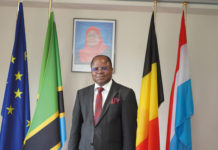1. Introduction
Greetings, from His Excellency, Ambassador Ammon Mutembwa, Ambassador of the Republic of Zimbabwe to the BENELUX and Permanent Representative to the European Union. It is my pleasure and honour to be addressing the CBL-ACP Business Forum and be sharing with you exciting news coming out of Zimbabwe as an investment destination.
2. Investment Opportunities
Zimbabwe is determined to be a leading destination of Foreign Direct Investment (FDI) as it offers immense opportunities across various sectors. In addition, the Government, under the leadership of His Excellency President Emmerson Dambudzo Mnangagwa, has prioritised improving the business environment under the banner “Zimbabwe is Open for Business”. The Government policy framework is rooted in the recently gazetted National Development Strategy (NDS) 1 (2021-2025) which lays foundation for the country to attain its 2030 Vision in which the Government wants the country and society to attain an upper middle-income status by 2030.
The investment landscape has been transformed through the setting up of the Zimbabwe Investment and Development Agency (ZIDA) and the ongoing implementation of the Ease of Doing Business reforms. Zimbabwe’s most unique selling points to investors, among others, include;
- Political stability, peace and security, democracy as well as adherence to rule of law;
- Security of Investments assured. President Mnangagwa has guaranteed the security of all foreign investments by repealing the Indigenization law;
- Growing private sector, anchored on macro-economic stability and Pro-market policies that government is implementing;
- Growing economy despite coronavirus pandemic over 7% growth rate expected in 2021 and likely to be repeated in 2022. A robust coronavirus pandemic response which guarantees post-coronavirus recovery;
- Attractive investment incentives in various sectors;
- Geographical location – regional hub centrally and strategically located at the heart of the Southern African Development Community (SADC) region and is thus a regional gateway: North-South Corridor & East-West Corridor; Regional logistics Hub- railways, roads;
- Diversified Economy – Manufacturing, Agriculture, Mining, Tourism, and Services Sector;
- Vast National Resources – Minerals, Wildlife, Cultural. There are over 40 exploitable minerals, including rare earth minerals;
- Versatile Human Capital Base – Highly skilled and trainable labour force, with high literacy rates at more than 90%;
- Regulations to facilitate and protect foreign investment namely the ZIDA Act as well as Bilateral Investment Promotion & Protection Agreements (BIPPAs) to protect investments;
- Special Economic Zones; Tourism, Manufacturing, Technology/Innovation Parks;
- Gateway to an untapped growing regional market-Zimbabwe is a member of COMESA, SADC and the COMESA-East African Community (EAC)-SADC Tripartite with a combined population of approximately 600 million and a GDP of around US$1 trillion- this opens vast opportunities for investors in the regional market. The African Continental Free Trade Area provides opportunities for the would-be investors;
- Zimbabwe is a party to the Interim Economic Partnership Agreement (iEPA) between the European Union (EU) and the East and Southern Africa (ESA) countries, (Mauritius, Seychelles, Madagascar, Comoros and Zimbabwe). The iEPA provides a Duty-Free Quota Free market access into the EU and also encourages regional integration;
- Business Environment Reforms-Zimbabwe has registered progress on the ease of doing business rankings. It is ranked number 140 on ease of doing business as per World Bank (2020). The establishment of ZIDA, a one-stop shop, is one of the milestones towards improving the ease of doing business.
- Zimbabwe has abundancy of highly skilled manpower, strong and relatively youthful human resource capital base, with literacy levels estimated at 90.7%.
3. Investment facilitation and Protection
In fact, the ZIDA Act clearly lays out the functions of the Agency which include; promoting and facilitating both local and foreign investment in the country; promoting the decentralization of investment activities; and implementation and coordination of investment programs and investment.
Through the ZIDA Act, the Zimbabwean Government made a bold statement about its Ease of Doing Business thrust and on unlocking Foreign Direct Investments (FDIs) into the country. Through the ZIDA, the government has addressed challenges such as Intellectual Property (IP), repatriation of funds, freedom of investment, fairness and non-discriminatory treatment, which in the past had contributed to the flight of investors. The ZIDA Act is deemed to be world class because it addresses these concerns and clearly states Government’s position and willingness to have investors coming back into the country. With respect to investments made under this Act, investors may, without restriction or delay, in a freely convertible currency, transfer the funds into and out of Zimbabwe. The ZIDA Act guarantees legal protection of investments and access to remedies when rights are violated. All investors have equal access to law and protection against denial of justice in criminal, civil and administrative proceedings, breaches of due (judicial and administrative) process, and targeted gender, racial or religious discrimination.
4. Investment Opportunities available
Zimbabwe offers investment opportunities in many sectors that include
- Mining;
- Agriculture and Processing;
- Tourism;
- Infrastructure Development and Manufacturing;
- Energy (Green Energy).
Investors can also opt for Public Private Partnerships (PPP) with Government and Local Authorities, Special Economic Zones that are being developed countrywide and in Medicinal Cannabis, the new business that investors are also clamoring for. Zimbabwe hosts many water bodies and dams, thus making the target of climate proofing agriculture achievable.
4.1 Mining sector
Government is interested in developing the following mineral value chains to achieve a USD12 billion contribution to the economy by 2023.
- Gold ore to bullion processing;
- Diamond cutting and polishing;
- Base metals (nickel, copper, iron, cobalt) recovery from PGMs;
- Coal to Coke;
- Phosphate to fertiliser;
- Chrome to ferrochrome;
- Lithium to iron petalite and Lithium batteries;
- Gas and Oil Exploration and Mining. Zimbabwe has enormous coalbed methane gas potential ready for development.
4.2 Tourism
Zimbabwe is endowed with vast tourist attractions ranging from natural to man-made historical sites. These include the Majestic Victoria Falls, Kariba; Great Zimbabwe Monuments; the scenic beauty of the Eastern Highlands; Matopos (a Cultural World Heritage Site) and the pristine habitats and wildlife (Great Limpopo Transfrontier Park, Hwange National Park, Malilangwe Wildlife Reserve).
The following areas are open for investment:
- Construction of 5 to 7-star Hotels and Lodges;
- Construction of International Convention Centres; Vic Falls, Hwange Transfrontier Park, Gona reZhou, Tokwe Mukosi, Harare, Mushumbi and Mana Pools;
- Photographic Safaris Camp Development;
- Tour Operations;
- Golf courses, each course plus specialized hospital/clinic in the Vic Falls area.
4.3 Energy
Investment opportunities are in renewable energy, notably solar, small hydropower, and wind energy generation. This will boost Zimbabwe’s energy generation capacity to about 3467MW by 2025.
Currently Zimbabwe’s energy mix is dominated by hydropower from Kariba South Power Station which contributes over 75% of energy output. The current expansion works and modernisation at Hwange Thermal Power will also improve power supply. Zimbabwe aims to increase contribution of solar and small hydro power generation through involvement of private sector which is currently developing a number of small to medium solar projects.
Government accommodates participation of Independent Power Producers (IPPs) and provides a framework in which these IPPs sell power to the national grid or directly to energy consumers.
Other Opportunities include:
- Untapped opportunities are in (Coal; Coal Bed Methane (CBM) Gas, geothermal and hydro-carbons value chains.
4.4 Infrastructure- … Roads, Railway and expansion plus modernisation of regional airports and ICT & the Digital Economy
4.4.1 Government’s Growth Strategies
Upscaling Private sector investment in the provision of public infrastructure.
Opportunities for investors
- Expansion and modernisation of roads, railways and airports;
- Industrial parks and shopping malls including utilities (roads, sewer, water and power), office parks and residential houses;
- Water and sanitation including, dam construction, sewer reticulation and waste management facilities;
- Health Sector including drug manufacturing and construction of specialised hospitals;
- ICT infrastructure.
5. Agriculture
Agriculture remains a priority sector for Zimbabwe despite the challenges caused by climate change.
The agribusiness opportunities in Zimbabwe are as outlined below:
- Manufacturing of irrigation equipment;
- Precision agriculture, use of efficient technologies;
- Production of pharmaceuticals for livestock;
- Production of medicinal cannabis;
- Fruit and processing.
6. Manufacturing sector
Opportunities in the sector are available in various value chains. This is in line with government ‘s agenda on structural transformation and value chains outlined in NDS1.
- Agro-based value chain;
- Pharmaceutical value chain;
- Bus and Truck assembly value chain;
- Iron and Steel and General Engineering value chain;
- Plastic waste value chain.
7. Special Economic Zones/Designated Zones
I. Victoria Falls Opportunities
- Construction of Convention centers;
- Construction of hotel accommodation;
- Medical Tourism;
- Financial Services hub;
- Shopping centres and tourist activities.
II. Harare – Sunway City Opportunities
- Information and Telecommunications;
- Industrial Park;
- Manufacturing hub;
- Logistics;
- Medical Parks.
III. Bulawayo Opportunities
- Engineering;
- Leather and textile;
- Minerals beneficiation;
- Agro-processing;
- Manufacturing;
- Power generation;
- Heavy and light industries;
- Logistics.
IV. Beitbridge Opportunities
- Logistics hub;
- Bonded warehouses;
- Solar power generation;
- Manufacturing;
- Minerals beneficiation;
- Agro-processing.
V. Mutare – Fernhill Opportunities
- Manufacturing;
- Precious Minerals beneficiation;
- Agro-processing;
- Tea and Coffee Plantations.
VI. Midlands-Gweru, Kwekwe, Chivhu/Mvuma area
- Steel manufacturing;
- Spare parts for cars;
- Equipment.
Incentives Offered to Investors in the SEZs
- Zero-rated Corporate Income Tax for the first 5 years of operation with a corporate tax rate of 15% applying thereafter;
- Special Initial allowance of 50% of cost from year one and 25% in the subsequent two years. Specialized expatriate staff will be taxed at a flat rate of 15%;
- Exemption from non-residents withholding tax on fees on services that are not locally available;
- Exemption from non-residents withholding tax on Royalties;
- Exemption from non-residents withholding tax on Dividends;
- 100% rebate on customs duty for all imported equipment, machinery and raw materials.
8. Conclusion
In conclusion, I would like to say that Zimbabwe has opened herself to investors and is willing to continuously improve the investment landscape and become a very attractive destination. The ongoing investor confidence survey being carried out by an independent company with the support of the World Bank, also attests to the extent to which Zimbabwe is performing and opening itself to the world. Investors from Belgium and Luxembourg are more than welcome to come to Zimbabwe, which is open for business. Potential investors can contact the Embassy or ZIDA using the following contacts outlined below.
H.E. A. Mutembwa
Ambassador
Contact details
H.E. Ammon Mutembwa Ambassador of the Republic of Zimbabwe
Embassy of Republic of Zimbabwe
Square Joséphine-Charlotte 11
Woluwe St Lambert 1200
Belgium
Email: zimbrussels@skynet.be
Phone: +3227625808
For:
ZIDA:
Direct Enquiries to:
Chief Executive Officer
Zimbabwe Investment and Development Agency
Cnr Jason Moyo and Sam Nujoma
ZB Life Towers, 1st Floor
Harare, Zimbabwe
Phone: +263242757933/263242780142-3/2638688002639-42
Email: info@zidainvest.com
![[:fr]Aerial,View,On,The,Main,Street,Of,Harare,In,Zimbabwe[:]](https://perspectives-cblacp.eu/wp-content/uploads/2021/11/03-696x464.jpg)


